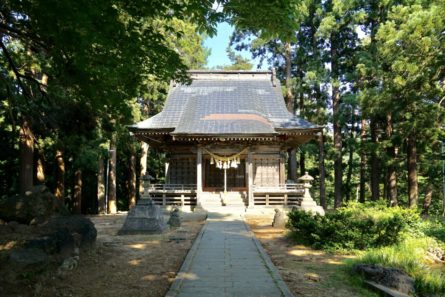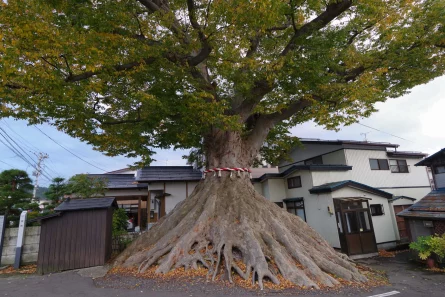- JEPAA Member
- Author
- Ryuhei Kanbe
- 作家
- 神部龍平
© 2024 Ryuhei Kanbe.
SCROLL
Portfolio /作品一覧
- ぼく、母さんとママ食ってきた(一部抜粋)/I’ve Eaten Mom and Mom (excerpt)
Art History /アートヒストリー
序文
秋田の小学校教員だった神部龍平には、作家というもう一つの顔があった。日本有数の豪雪地帯・湯沢に生まれた弱虫な少年の心の中に、文学の火が灯り、やがて大きな炎のように燃え盛っていく。教育と文学、二つの世界で自己と向き合う生き様をその半生と共にご紹介する。
幼少期
神部龍平は昭和7(1932)年2月20日、秋田県の湯沢市愛宕町に神部家の長男として生まれました。父親は早くに亡くなり、母親が女手一つで育ててくれたと言います。
秋田県湯沢市は日本有数の豪雪地帯として知られる一方、名水の町としても有名で、市の中央から湧き出す「力水」は日本の名水百選にも数えられます。また美味しい水を利用した地元名産の稲庭うどんや日本酒など、美食の町としても有名です。
そんな湯沢市愛宕町で、龍平少年は物静かな優しい少年として育ちます。
「弱虫な子どもだったと思います。でも、男の子は 勇ましくなければいけないという時代でしたからね。」折りしも当時は第二次世界大戦の真っ只中。成人 男子はお国のために戦って来いと言われたご時世にあって、龍平少年が肩身の狭い思いをしていたことは想像するに難くありません。
そんな神部家と龍平少年に大きな影響を与えたのが、学校教員の叔母でした。時に厳しく、時に優しく接する叔母の存在は、ある意味で父親に近しいものだったのかもしれません。小学校高学年に至って学校の成績で遅れを取っていた際は、叱咤激励して猛勉強を促します。また卒業時には学業の大切さを説き、県立中学への進学を勧めてくれたと言います。
中でも子ども用の月刊誌をプレゼントしてくれたことは、龍平少年にとって忘れられない思い出となりました。この素晴らしい贈り物が後々の優れた創造性の種になったと言っても過言ではないでしょう。
学生時代
叔母の勧めで受験した県立愛宕中学校に無事合格した龍平少年ですが、その学生生活は決して我々現代人が思い描くような夢と希望に溢れたものではありませんでした。何しろ戦争が激化した1940年代前半は、日本中どこもかしこも食糧不足の人手不足。龍平少年も晴れた日は割り当てられた畑を耕すばかりの日々を強いられました。
「勉強なんてさせてもらえませんでした。ただ懸命に生きていくだけの日々でしたよ」
戦争はその辛い中学生活の最中に終了しますが、暮し向きが厳しいことは変わりません。
ところがそんな学生生活に、思わぬ変化が訪れます。きっかけはまたしても叔母でした。彼女が取り始めた新聞を手にした際、俳句短歌川柳の読者投稿が目に飛び込んできたのです。面白そう、なんとなく自分でもできそうだな、と思った龍平少年は、自作の短歌を密かに応募しました。
「いくとせも これぞと思う日も無くて 母は我が家にすでに老いたり」
とても高校生が試しに詠んだとは思えない、なかなかの秀作です。
しかしここで思わぬ失態を犯してしまいます。なんと母親が応募前のこの短歌を目にしてしまったのです。しかも当時の母親の年齢は45歳。とても「すでに老いたり」なんて言えるような年齢ではありません。慌てて詫びる龍平少年を母親は笑って許してくれたと言いますが、なんともバツの悪い短歌デビューでした。
ところが話はここで終わりません。なんとこのほろ苦の一首が新聞の短歌投稿の欄に掲載されてしまったのです。しかしこのひょんなデビューをきっかけに、龍平少年は文学をより強く意識するようになります。そしてその第一歩は、やがて作家としての大きな道筋へと繋がっていくのです。
大学時代
高校卒業後、神部は地元の酒屋勤めを経て、国立の秋田大学に入学します。ところが入学後は大学の仲間と詩や短歌を作ること、見ることに熱中してしまいます。また、高校時代の恩師・伊藤六郎先生から作文や小説を書くよう勧められ、様々な文芸を読み漁っていきました。こうして文学における感性を磨いた神部は、表現の引き出しを身につけていったわけです。
- 秋田県湯沢の総鎮守・愛宕神社
- 愛宕一里塚の大けやき。樹齢400年を超える
社会人時代、作家へ
大学卒業後、地元秋田で教員となった神部は、子どもたちと向き合いながらおよそ40年にわたって先生の仕事を全うしました。
一方で文芸においてもますます精力的に創作活動に取り組んでいきます。ちょうど大学時代に身につけた感性と表現の引き出しが、人生経験を経て自分のものとなっていったのです。
その活動のベースは、伊藤六郎先生の主宰する同人誌「雪国」でした。当時はプロとしての作家活動が狭き門だったこともあり、気楽に自分の思うことを形にしていける同人誌の活動は、教職で忙しく働く神部にとってちょうどよかったのかもしれません。
しかしそんな日々の中で、ある思いが芽生えます。
「創作者としての力量がどれほどのものか試してみたい」
こうして神部は、作家としての挑戦を開始します。当初は自分自身がこれまでやってきたものがどれほどなのか確認する程度のつもりでした。しかし 1970年の秋田県教職員文芸「創作の部」特選を皮切りに、次々と受賞歴が積み重なっていくことで、自分自身のこれまでの活動が間違っていなかったことを実感します。
中でも北日本文学賞の受賞は、作家としての自己を確信するにふさわしい出来事でした。
これを境に、神部はいっそう作家として精力的な創作活動を展開し始めます。紙面連載のオファーも増え、2004年から始まった毎日新聞「木曜の窓」は、今年で19年目を向かえるに至りました。その一方で、自分を育ててくれた「雪国」の編集長を務めるようになります。そして現在では、自分が伊藤先生に指導を受けたように、後進の育成に取り組む日々を送っています。
「いろんな方が表現できる場が常にあり続ける環境づくり、それが伊藤先生たちに育ててもらった私の役目だと思っています」
Introduction
Ryuhei Kanbe, an elementary school teacher in Akita, had another side to him, which was a writer. Born in Yuzawa, with one of the heaviest snowfalls in all of Japan, the young, cowardly boy’s heart was ignited with a spark by literature, which eventually became a flame. Here, we will take a closer look at Kanbe’s life in the two worlds of education and literature as he strived to be true to himself.
Childhood
Ryuhei Kanbe was born on February 20, 1932 as the eldest son of the Kanbe family in Atago Town, Yuzawa City, Akita Prefecture. He was raised by his mother, after his father passed away at a young age.
While Yuzawa City, Akita Prefecture is known for having some of the heaviest snowfall in all of Japan, the area is also famous for its water. The “Power Water” (chikaramizu) spring bubbling up from the city center is considered one of the 100 most famous waters in Japan. In addition, the city is also known for its local gourmet including specialty item Inaniwa udon and sake made from this delicious water.
In Atago-cho, Yuzawa City, Ryuhei grew up as a quiet and gentle boy.
“I recall myself as a crybaby when I was a kid. But I was raised in a time that boys had to be strong.”
It was during the World War II at that time. In a time when grown men were told to fight for their country, it was not hard to imagine that young Ryuhei was afraid of the world.
One person that had a great influence on the Kanbe family and young Ryuhei was his aunt who was a teacher at school. The aunt, who was sometimes strict and other times gentle, was perhaps close to a father figure on some level. She scolded and encouraged him to study seriously when his grades fell behind in his upper elementary school years. When Ryuhei finished elementary school, his aunt preached the importance of academic learning and recommended that he go on to a prefectural junior high school.
Among memories of these years, the gift of a monthly magazine for children was the most memorable for young Ryuhei. It is no exaggeration to say that this wonderful gift had planted the seed of his great creativity later on.
Student Days
Although young Ryuhei successfully past the entrance exam and was admitted to Atago Junior High School as his aunt had recommended, his student life was never filled with dreams and hopes that we modern people would imagine. After all, in the first half of the 1940s, there was a shortage of food and labor everywhere in Japan as the war intensified. Like others, young Ryuhei wasalso forced to plow certain fields on sunny days. “I wasn’t allowed to study. Those were the days when I just tried hard to survive.”
Even though the war ended during his tough years in junior high school, his life nonetheless remained difficult.
One day, an unexpected opportunity knocked on his door.
The catalyst was once again his aunt. When he picked up the newspaper his aunt had begun subscribing, a reader’s submission of haiku tanka and senryu poems jumped into his view. Young Ryuhei was interested and thought it might be something he could write as well. He secretly entered the tanka contest.
“No matter how many years have passed, there’s not a day when I think this is the right thing to do. My mother is already old at home.”
It’s hard to believe that this splendid piece of work was written by a high school student.
However, this was where he made an unexpected blunder. Somehow, his mother saw the tanka before his submission. At that time, his mother was 45 years old. It’s certainly not an age to be considered as “old”. Ryuhei apologized in a panic, but his mother laughed about it and forgave him. It was an embarrassing tanka debut.
But the story does not end here. Surprisingly, this bittersweet poem was published in the tanka submission column in the newspaper. However, this unexpected debut triggered Ryuhei to become more conscious of literature This first step eventually took him on a major path as a writer.
University Days
After graduating high school, Kanbe worked at a local liquor store before attending the national Akita University. After entering university, he became fascinated with composing and reading poems and tanka with his friends. In addition, he was encouraged by his dear high school teacher Rokuro Ito to write essays and novels, and read a variety of literature. In this way, Kanbe had refined his sensibility in literature and acquired the ability to express himself.
Full Time Career, and as a Writer
After graduating from university, Kanbe became a teacher in his hometown of Akita. He devoted himself to his career for around 40 years working with children.
At the same time, in terms of literary arts, he was also committed to dedicating more energy to his creative activities. The sensibility and ways of expression that he had acquired at university became his own through life experience.
The base of his creative activities was a direct publication called Yukiguni, which was chaired by Rokuro Ito. Since it was competitive to become a professional writer at the time, working on this publication allowed Kanbe to casually express his work in the way he liked. This was probably just the right thing for him as he was also busy with his teaching career.
However, a certain thought sprouted during those days.
“I want to see how competent I am as a creator.” As such, Kanbe began his challenge as a writer. At first, his intention was to merely validate the level of his work to date. After winning the special prize in the creative division of the Akita Prefectural Teachers Writing Contest in 1970, he continued to receive one award after another, which showed him that his efforts had been well worth it.
In particular, receiving the Northern Japan Literary Award was an event worthy of proving himself as a writer.
From that point on, Kanbe began to actively expand on his creative activities as a writer. He also received more offers to write newspaper columns. His column called Thursday Window in Mainichi Shimbun that started in 2004 is heading into its 19th year this year. Meanwhile, he also became the editor-in-chief of the direct publication, Yukiguni, that had fostered his ability as a writer. Currently, he spends his time fostering next generation writers as he had been mentored by Mr. Ito.
“I believe it is my responsibility to create an environment where various people can express themselves as Mr. Ito once taught me.”
Profile /経歴
神部龍平 Ryuhei Kanbe
1932年 秋田県出身
秋田大学学芸学部卒業
主な受賞歴 秋田県教職員文芸「創作の部」特選(1970)、第5回北日本文学賞(1970)、第1回さきがけ文学賞選奨(1980)など。
Born in Akita,Japan 1932
Graduated from Akita University,
Major awards include: Akita Prefecture Teachers’ Literature “Creative Writing Division” Special Prize (1970), the 5th Kitanihon Literature Award (1970), and the 1st PRESTO Prize for Literature (1980).





